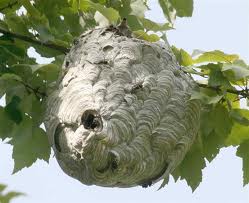There's a buzz in the air this month and it has nothing to do with the Red Sox (this year anyway). The only thing that stings a little more than the Sox falling out of playoff contention is a wasp or yellow jacket next that poses a danger to your family! Late summer is traditionally the most active bee season in New England. But do you know the reasons why? 
Bees of all kinds (honey bees, wasps, yellow jackets, etc.) won't buzz off until the temperature gets colder in the fall, especially overnight. In order to survive, bees need to feed on a source of carbohydrates and protein. In New England, they have an ample source of this material, in the month of August, at least, Stinging inspects are out gathering nectar and pollen from blooming plants. They're seeking to store this food source to help their colony survive. Nectar is a form of carbohydrates, while pollen is a protein that allows bees to thrive.
Wasps are also enjoying a late summer buzz in activity. During the spring and early summer (depending on our unpredictable New England weather), wasps are finding easy sources of protein by consuming other insects, including mosquitoes. But as more flowers and plants bloom during the summer, wasps are able to shift their attention to the "carbo-loading" ease of nectar.
Our team at Burgess Pest Management encounters bees nests of all shapes and sizes, often in some very difficult locations, such as inside a wall or ceiling.. Although bees play an extremely important role in our ecosystem, there are times when treating a nest is necessary. For example, if an active wasp or hornets nest is located on your property, and poses a serious threat to humans, the nest should be properly removed.
Honeybees are protected under the law, so if you suspect that you may have a honeybee swarm, you should never treat them on your own. We often refer people to reputable beekeepers who are able to safely remove the nest.
The exact method of properly treating and removing a wasp or hornet nest varies depending on the circumstances. Our team at Burgess Pest first inspects to determine the type of bee, so we can apply the proper product. As always, safety is our top priority.
If you need any information on Massachusetts bee control, simply click the tab below and one of our specialists will be in touch to provide you with additional information about practices and pricing!


